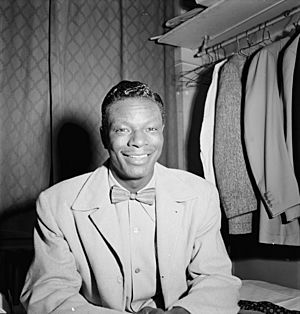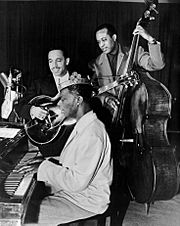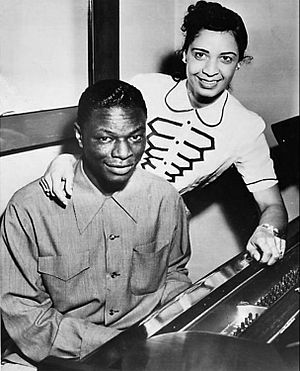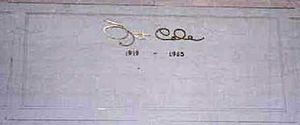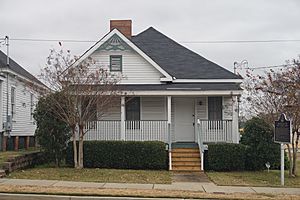Nat King Cole facts for kids
Quick facts for kids
Nat King Cole
|
|
|---|---|
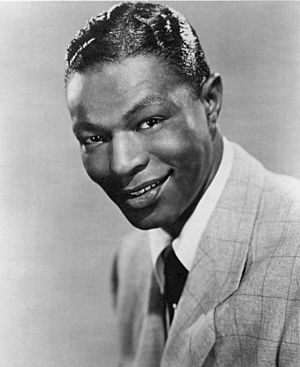
Cole in 1959
|
|
| Background information | |
| Birth name | Nathaniel Adams Coles |
| Born | March 17, 1919 Montgomery, Alabama, U.S. |
| Died | February 15, 1965 (aged 45) Santa Monica, California, U.S. |
| Genres | |
| Occupation(s) |
|
| Instruments |
|
| Years active | 1934–1965 |
| Labels |
|
| Associated acts |
|
Nathaniel Adams Coles (born March 17, 1919 – died February 15, 1965), known as Nat King Cole, was an American singer, jazz pianist, and actor. He became famous in the late 1930s and had a career that lasted almost 30 years. He recorded over 100 hit songs.
Nat King Cole received many awards, including a star on the Hollywood Walk of Fame in 1960. After he passed away, he was given the Grammy Lifetime Achievement Award in 1990. He was also inducted into the Rock and Roll Hall of Fame in 2000.
He started his career as a jazz pianist and formed The King Cole Trio. This group became very popular in the 1940s. Later, in 1950, he became a solo singer. Even though he was very successful, he faced racial discrimination. Cole was a member of the NAACP. He also took part in the 1963 March on Washington.
From 1956 to 1957, he hosted The Nat King Cole Show on NBC. This was the first nationally broadcast TV show hosted by an African American. Some of his most famous songs include "Unforgettable", "Smile", and "Mona Lisa". His Christmas album, The Magic of Christmas, is also very well-known. Nat King Cole was the father of singer Natalie Cole.
Contents
Nat King Cole: A Music Legend
Early Life and Musical Beginnings
Nathaniel Adams Coles was born in Montgomery, Alabama, on March 17, 1919. He had three brothers, Eddie, Ike, and Freddy, and a half-sister, Joyce. All of his brothers also became musicians. When Nat was four, his family moved to Chicago, Illinois. His father, Edward Coles, became a Baptist minister there.
Nat learned to play the organ from his mother, Perlina Coles, who was the church organist. He first performed a song called "Yes! We Have No Bananas" when he was just four years old. He started formal piano lessons at age 12. He learned jazz, gospel, and classical music.
His family moved to the Bronzeville neighborhood in Chicago. He attended Wendell Phillips Academy High School. He would often sneak out to clubs to listen to famous jazz musicians like Louis Armstrong.
The King Cole Trio
When he was 15, Nat left high school to focus on music. He and his brother Eddie, who played bass, formed a group called Eddie Cole's Swingsters. They recorded two songs in 1936. Nat then went on tour with a musical called Shuffle Along. In 1937, he married Nadine Robinson, who was also in the show.
After the show ended in Los Angeles, Nat and Nadine stayed there. He started playing piano in nightclubs. A club owner asked him to form a band. He hired bassist Wesley Prince and guitarist Oscar Moore. They called themselves the King Cole Swingsters. Later, they changed their name to the King Cole Trio.
In 1940, the trio recorded "Sweet Lorraine", which became Nat's first hit. People started asking him to sing more songs. This is how he began his career as a vocalist.
Becoming a Solo Star
In 1946, the King Cole Trio had their own 15-minute radio show called King Cole Trio Time. This was the first radio show hosted by a Black musician. They also performed on other radio programs.
Nat started recording pop songs with a string orchestra. This helped him become a huge pop star. Some of his big hits included "The Christmas Song" (1947), "Nature Boy" (1948), and "Mona Lisa" (1950).
On November 5, 1956, The Nat 'King' Cole Show started on NBC. It was one of the first TV shows hosted by an African American. The show began as 15 minutes long and later became a half-hour. However, it struggled to find national sponsors. Nat decided to end the show in December 1957. He said that "Madison Avenue is afraid of the dark," referring to the lack of sponsorship.
Throughout the 1950s, Nat King Cole continued to have many hit songs. These included "Smile" and "A Blossom Fell". His album Love Is the Thing reached number one in 1957. In 1959, he won a Grammy Award for "Midnight Flyer".
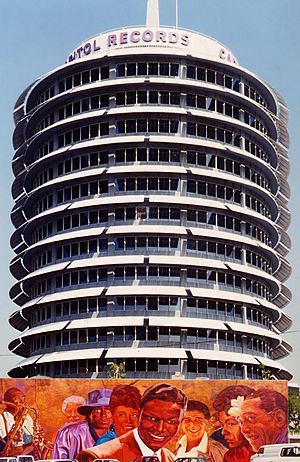
In 1958, Cole recorded Cole Español in Havana, Cuba. This album was sung entirely in Spanish and was very popular. He followed it with two more Spanish albums.
Facing Challenges: Civil Rights
Nat King Cole faced intense racial discrimination throughout his career. Despite his fame, he was often treated unfairly because of his race. For example, he was attacked on stage in Alabama in 1956 by white supremacists.
Even though he wasn't a loud public speaker for the civil rights movement, he was very active. He was a member of the local NAACP branch. He also performed regularly for civil rights organizations. In 1963, he participated in the historic March on Washington. He also advised Presidents John F. Kennedy and Lyndon B. Johnson on civil rights issues.
Later Career and Legacy
In the 1960s, Nat King Cole continued to record hit songs. These included "Ramblin' Rose" (1962) and "Those Lazy-Hazy-Crazy Days of Summer" (1963). He also appeared in several films and TV shows. He played W. C. Handy in the film St. Louis Blues (1958).
Some jazz critics thought he had left his jazz roots behind by singing pop songs. However, he still recorded jazz albums, like After Midnight in 1956.
His daughter, Natalie Cole, made "Unforgettable" famous again in 1991. She used modern technology to sing a duet with her father's original recording. This duet won seven Grammy awards.
Personal Life and Family
Nat King Cole joined Freemasonry in 1944. He was also a big fan of baseball, especially Hank Aaron.
He married his first wife, Nadine Robinson, when he was 18. This marriage ended in 1948. Six days later, he married singer Maria Hawkins. They had five children: his daughter Natalie Cole (who became a famous singer), an adopted daughter Carole, an adopted son Nat Kelly Cole, and twin daughters Casey and Timolin. Maria stayed with him until his death.
His Final Years
In September 1964, Nat King Cole started losing weight and had back pain. Doctors found a serious tumor in his left lung. Cole was a heavy cigarette smoker and had lung cancer. He was told he only had a few months to live.
Despite his illness, Cole continued to work. He made his final recordings in December 1964. These songs were released on the album L-O-V-E shortly before he passed away. He did this to make sure his family would be taken care of.
He entered the hospital in December. His condition worsened, and he died on February 15, 1965, at the age of 45. His funeral was held in Los Angeles. Many famous people attended, including Frank Sinatra and Sammy Davis Jr.. He was buried in Forest Lawn Memorial Park in Glendale, California.
Posthumous Releases
Nat King Cole's last album, L-O-V-E, was released just before he died. It reached number 4 on the Billboard Albums chart. His 1957 recording of "When I Fall in Love" became a hit in the UK in 1987.
In 1991, a collection of 349 of his songs was released. Also in 1991, his daughter Natalie Cole recorded a new vocal track for "Unforgettable". This created a duet with her father's 1961 recording. The song and album won seven Grammy awards in 1992.
Awards and Honors
Nat King Cole has received many honors. He was inducted into the Alabama Music Hall of Fame and the Alabama Jazz Hall of Fame. He received the Grammy Lifetime Achievement Award in 1990. In 1992, he received the Sammy Cahn Lifetime Achievement Award from the Songwriters Hall of Fame.
He was also inducted into the DownBeat Jazz Hall of Fame in 1997. A United States postage stamp with his picture was issued in 1994. Cole was inducted into the Rock and Roll Hall of Fame in 2000. In 2020, he was inducted into the National Rhythm & Blues Hall of Fame.
Nat King Cole's records sold 50 million copies during his career. His recording of "The Christmas Song" is still played every holiday season.
Discography
- The King Cole Trio (1944)
- The King Cole Trio, Volume 2 (1946)
- The King Cole Trio, Volume 3 (1947)
- The King Cole Trio, Volume 4 (1949)
- Nat King Cole at the Piano (1950)
- Harvest of Hits (1950)
- King Cole for Kids (1951)
- Penthouse Serenade (1952)
- Top Pops (1952)
- Two In Love (1953)
- Unforgettable (1954)
- Penthouse Serenade (1955)
- Nat King Cole Sings for Two in Love (1955)
- The Piano Style of Nat King Cole (1955)
- After Midnight (1957)
- Just One of Those Things (1957)
- Love Is the Thing (1957)
- Cole Español (1958)
- St. Louis Blues (1958)
- The Very Thought of You (1958)
- To Whom It May Concern (1958)
- Welcome to the Club (1958)
- A Mis Amigos (1959)
- Tell Me All About Yourself (1960)
- Every Time I Feel the Spirit (1960)
- Wild Is Love (1960)
- The Magic of Christmas (1960)
- The Nat King Cole Story (1961)
- The Touch of Your Lips (1961)
- Nat King Cole Sings/George Shearing Plays (1962)
- Ramblin' Rose (1962)
- Dear Lonely Hearts (1962)
- More Cole Español (1962)
- Those Lazy-Hazy-Crazy Days of Summer (1963)
- Where Did Everyone Go? (1963)
- Nat King Cole Sings My Fair Lady (1964)
- Let's Face the Music! (1964, recorded 1961)
- I Don't Want to Be Hurt Anymore (1964)
- L-O-V-E (1965)
- Nat King Cole Sings His Songs From 'Cat Ballou' and Other Motion Pictures (1965)
- Live at the Sands (1966, recorded 1960)
His hit singles include:
- "Straighten Up and Fly Right" (1944)
- "The Christmas Song" (1946)
- "Nature Boy" (1948)
- "Mona Lisa" (1950)
- "Frosty, The Snowman" (1950)
- "Too Young" (1951)
- "Unforgettable" (1951)
- "A Blossom Fell" (1955)
- "Send for Me" (1957)
- "Ramblin' Rose" (1962)
- "Those Lazy, Hazy, Crazy Days of Summer" (1963)
- "Unforgettable" (1991, with daughter Natalie)
Filmography
Film
| Year | Title | Role | Notes |
|---|---|---|---|
| 1943 | Here Comes Elmer | Himself | |
| 1943 | Pistol Packin' Mama | As part of the King Cole Trio | Uncredited |
| 1944 | Pin Up Girl | Canteen pianist | Uncredited |
| 1944 | Stars on Parade | As part of the King Cole Trio | |
| 1944 | Swing in the Saddle | As part of the King Cole Trio | Uncredited |
| 1944 | See My Lawyer | Specialty act | As part of the King Cole Trio |
| 1944 | Is You Is, or Is You Ain't My Baby? | Himself | Short subject |
| 1945 | Frim Fram Sauce | Himself | Short subject |
| 1946 | Breakfast in Hollywood | As part of the King Cole Trio | |
| 1946 | Errand Boy for Rhythm | Himself | Short subject |
| 1946 | Come to Baby Do | Himself | Short subject |
| 1948 | Killer Diller | Himself | As part of the King Cole Trio |
| 1949 | Make Believe Ballroom | Himself | As part of the King Cole Trio |
| 1950 | King Cole Trio & Benny Carter Orchestra | Himself | Short subject |
| 1951 | You Call It Madness | Himself | Short subject |
| 1951 | When I Fall in Love | Himself | Short subject |
| 1951 | The Trouble with Me Is You | Himself | Short subject |
| 1951 | Sweet Lorraine | Himself | Short subject |
| 1951 | Route 66 | Himself | Short subject |
| 1951 | Nature Boy | Himself | Short subject |
| 1951 | Mona Lisa | Himself | Short subject |
| 1951 | Home | Himself | Short subject |
| 1951 | For Sentimental Reasons | Himself | Short subject |
| 1951 | Calypso Blues | Himself | Short subject |
| 1952 | Nat "King" Cole and Joe Adams Orchestra | Himself | Short subject |
| 1953 | The Blue Gardenia | Himself | |
| 1953 | Small Town Girl | Himself | |
| 1953 | Nat "King" Cole and Russ Morgan and His Orchestra | Himself | Short subject |
| 1955 | Kiss Me Deadly | Singer | Voice |
| 1955 | Rhythm and Blues Revue | Himself | Documentary |
| 1955 | Rock 'n' Roll Revue | Himself | Short subject |
| 1955 | The Nat 'King' Cole Musical Story | Himself | Short subject |
| 1955 | Rhythm and Blues Revue | Himself | Documentary |
| 1956 | The Scarlet Hour | Nightclub vocalist | |
| 1956 | Basin Street Revue | Himself | |
| 1957 | Istanbul | Danny Rice | |
| 1957 | China Gate | Goldie | |
| 1958 | St. Louis Blues | W. C. Handy | |
| 1959 | Night of the Quarter Moon | Cy Robbin | A.k.a. The Color of Her Skin |
| 1959 | Premier Khrushchev in the USA | Himself | Documentary |
| 1960 | Schlager-Raketen | Sänger, Himself | |
| 1965 | Cat Ballou | Shouter | Released posthumously, (final film role) |
| 1989 | Benny Carter: Symphony in Riffs | Himself | Documentary |
Television
| Year | Title | Role | Notes |
|---|---|---|---|
| 1950 | The Ed Sullivan Show | Himself | 14 episodes |
| 1951–1952 | Texaco Star Theatre | Himself | 3 episodes |
| 1952–1955 | The Jackie Gleason Show | Himself | 2 episodes |
| 1953 | The Red Skelton Show | Himself | Episode #2.20 |
| 1953–1961 | What's My Line? | "Mystery guest" | 2 episodes |
| 1954–1955 | The Colgate Comedy Hour | Himself | 4 episodes |
| 1955 | Ford Star Jubilee | Himself | 2 episodes |
| 1956–1957 | The Nat King Cole Show | Host | 42 episodes |
| 1957–1960 | The Dinah Shore Chevy Show | Himself | 2 episodes |
| 1958 | The Patti Page Show | Himself | Episode #1.5 |
| 1959 | The Perry Como Show | Himself | Episode: January 17, 1959 |
| 1959 | The George Gobel Show | Himself | Episode #5.10 |
| 1960 | The Steve Allen Show | Himself | Episode #5.21 |
| 1960 | This Is Your Life | Himself | Episode: "Nat King Cole" |
| 1960 | Academy Award Songs | Himself | TV movie |
| 1960 | Special Gala to Support Kennedy Campaign | Himself | TV movie |
| 1961 | Main Event | Himself | TV movie |
| 1961–1964 | The Garry Moore Show | Himself | 4 episodes |
| 1962–1964 | The Jack Paar Program | Himself | 4 episodes |
| 1963 | An Evening with Nat King Cole | Himself | TV movie |
| 1963 | An Evening with Nat King Cole | Himself | BBC Television special |
| 1963 | The Danny Kaye Show | Himself | Episode #1.14 |
| 1964 | Freedom Spectacular | Himself | TV movie |
| 1964 | The Jack Benny Program | Nat | Episode: "Nat King Cole, Guest" |
See also
 In Spanish: Nat King Cole para niños
In Spanish: Nat King Cole para niños
- List of African-American firsts
- List of Freemasons
- The Ethel Waters Show


